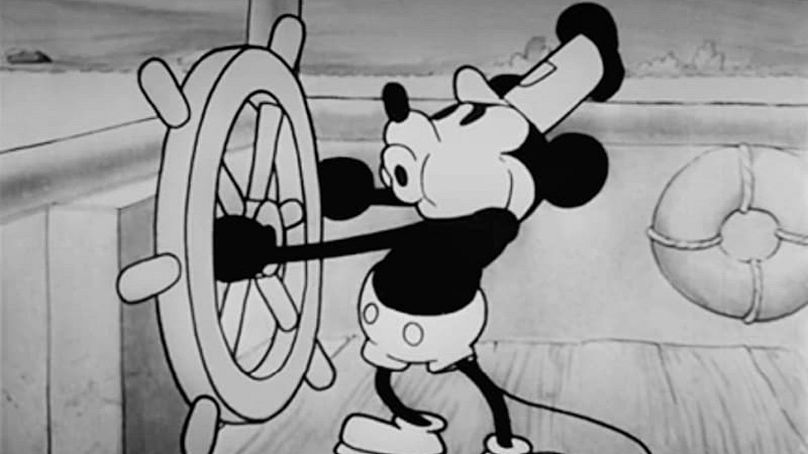Anyone getting any ideas of starting a film company or a theme park with mouse ears as their logo have another think coming...
Next year, Mickey Mouse’s first screen release, the 1928 short Steamboat Willie, becomes available for public use.
 ADVERTISEMENT
ADVERTISEMENT
 ADVERTISEMENT
ADVERTISEMENT
That means, with several caveats, that at least one version of the most iconic character in American pop culture will be free from Disney’s copyright and enter the public domain in 2024.
Current artists and creators will be able to make use of Mickey, but only the more rat-like, non-speaking boat captain from “Steamboat Willie”.
Still, that’s enough to get people excited.
“This is it. This is Mickey Mouse. This is exciting because it’s kind of symbolic,” said Jennifer Jenkins, a professor of law and director of Duke’s Center for the Study of Public Domain, who writes an annual Jan. 1 column for “Public Domain Day.” ”I kind of feel like the pipe on the steamboat, like expelling smoke. It’s so exciting.”
“It’s sometimes derisively referred to as the Mickey Mouse Protection Act,” Jenkins said. “That’s oversimplified because it wasn’t just Disney that was pushing for term extension. It was a whole group of copyright holders whose works were set to go into the public domain soon, who benefited greatly from the 20 years of extra protection.”
Not every feature or personality trait a character displays is necessarily copyrightable, however, and courts could be busy in the coming years determining what’s inside and outside Disney’s ownership.
US law allows a copyright to be held for 95 years after Congress expanded it several times during Mickey’s life.
“We will, of course, continue to protect our rights in the more modern versions of Mickey Mouse and other works that remain subject to copyright,”said Disney in a statement.
Indeed, Disney still separately holds a trademark on Mickey as a corporate mascot and brand identifier, and the law forbids using the character deceptively to fool consumers into thinking a product is from the original creator.
So, anyone getting any ideas of starting a film company or a theme park with mouse ears as their logo have another think coming.
Disney’s statement said it “will work to safeguard against consumer confusion caused by unauthorized uses of Mickey and our other iconic characters.”
Steamboat Willie, directed by Walt Disney and his partner Ub Iwerks and among the first cartoons to have sound synced with its visuals, was actually the third cartoon featuring Mickey and Minnie the men made, but the first to be released. It features a more menacing Mickey captaining a boat and making musical instruments out of other animals.
In it, and in a clip from it used in the introduction to Disney animated films in recent years, Mickey whistles the 1910 tune “Steamboat Bill.”
The song inspired the title of the Buster Keaton film “ Steamboat Bill Jr,” released just a few months before Steamboat Willie, which in turn may have inspired the title of the Disney short. The copyright wasn’t renewed on the Keaton film and it’s been in the public domain since 1956.
Another famous animal sidekick, Tigger, will join his friend Winnie the Pooh in the public domain as the book in which the bouncing tiger first appeared, “The House at Pooh Corner,” turns 96.
Pooh, probably the most celebrated prior character to become public property, took on that status two years ago when A.A. Milne’s original “Winnie the Pooh” entered the public domain, resulting in some truly novel uses, including this year’s horror film Winnie The Pooh: Blood and Honey.
Young Mickey could get the same treatment. And considering how gouge-your-eyes-out-terrible Blood and Honey was, that's scary in and of itself...
Other properties entering the US public domain are Charlie Chaplin’s film Circus, Virginia Woolf’s novel “Orlando”, and Bertolt Brecht’s musical play “The Threepenny Opera.”











